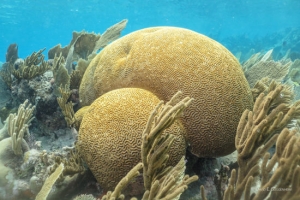Are the Healthiest Reefs Now Dying?
I’m now closing in on two decades of my life working in Cuba. Over those years you’ve no doubt heard me effusive with joy seeing the health of Cuba’s coral reefs. I still consider them among the healthiest coral reefs in the Caribbean where, tragically, we have lost 50 percent of coral cover since 1970.
Hundreds have joined us on trips to Cuba and have delighted in these thriving coral reef ecosystems, marveling at healthy elkhorn corals, coming face-to-face with enormous goliath groupers, sharks and sea turtles. I’ve often said that Cuba came to my emotional rescue at a time when I thought saving coral reefs had become hopeless. Cuba’s coral reefs have given many of us hope that coral reefs can be rescued and that Cuba can stand as a model and living laboratory toward that end.
It therefore pains me to say that over the past three years I have seen Cuban coral reefs beginning to degrade and die. Last month I led a small delegation to Cuba’s Isle of Youth where we dove in Punta Frances, part of Cuba’s vast network of marine protected areas covering 25 percent of its waters. Fishing is prohibited in Punta Frances. Sadly I have witnessed a decline in the health of the ecosystem, including reefs increasingly smothered by algae, an absence of fish, and extensive coral bleaching. From a depth of 120 feet I could see that the bleaching continued for at least another 100 feet below me.
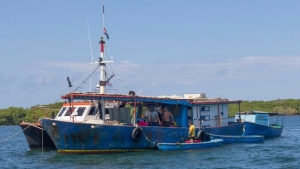
A Cuban commercial fishing vessel taking fish inside the Punta Frances Marine Protected Area where fishing is prohibited.
One of the reasons coral reefs die is the fact that we are taking too many fish out of the oceans. We still use the term “harvest” to describe pulling fish from the sea as if they are crops that grow for our taking, like corn. But fish are an integral part of the marine ecosystem with important jobs to do, so removing them amounts to tearing at the very fabric of what makes ocean ecosystems work. Among the critical jobs that fish have is grazing the algae that would otherwise smother coral reefs.
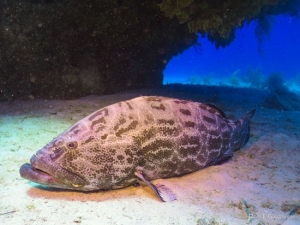
Fish, like this black grouper off southern Cuba, are an integral part of the marine ecosystem. Removing them amounts to removing a part of the ecosystem with detrimental effects, including adverse impacts on coral reefs.
So it was with great surprise and dread that one more than one occasion visiting Punta Frances we’ve encountered Cuban commercial fishing vessels from other Cuban provinces fishing in the middle of the protected area. Last month our boat passed one such commercial fishing vessel, with its expansive nets deployed across a channel and pulling in tons of fish as they swam with the tide toward their feeding grounds. It’s common knowledge among our Cuban colleagues that this takes place. There’s no doubt in my mind that such extensive fishing is a major factor in the degrading health of the reefs. Indeed, a wealth of scientific research points to overfishing as one of the major contributors to the decline of marine ecosystems. This is especially important because caring for reefs at a local level — including controlling fishing — can make them more resilient against global factors, such as a warming climate.
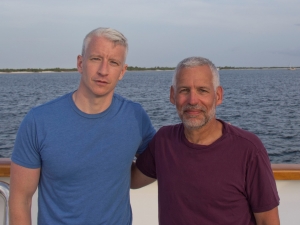
60 Minutes Correspondent, Anderson Cooper and I during the filming of a segment illustrating the health of Cuba’s coral reefs, the important role of protected areas and how tourism can provide important incentives for conservation.
This is an issue not limited to Cuba, of course. There are “paper parks” lacking enforcement throughout the world. Solving such problems represents a great challenge. The best solutions provide strong financial incentives for local communities to protect their natural resources. For those of you who saw my appearance on 60 Minutes with Anderson Cooper, you saw a story of how a protected area attracted ecotourism and, in turn, produced significant income for local economies. These communities have strong incentives to protect the ecosystem and it’s been a model of great success. If an unfamiliar vessel enters the preserve, everyone — from the captain of a dive boat to the boat’s cook — jumps into action to make sure it’s not there to fish illegally. Consequently, the ecosystem is thriving and has, in turn, created many quality jobs for locals.
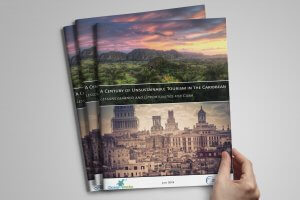
Report: “A Century of Unsustainable Travel in the Caribbean: Lessons Learned and Opportunities for Cuba”
Tourism is clearly a powerful tool to help local economies, and ecotourism can provide the incentives for residents to protect their ecosystems. But too much of a good thing can also be a bad thing. If you read the report we released last year with the Center for International Policy, “A Century of Unsustainable Tourism in the Caribbean: Lessons Learned and Opportunities for Cuba,” you’ll read accounts of how the history of mass tourism in the Caribbean has been nightmarish, having led to the destruction of coral reefs, culture and has benefited multinational corporations at the expense of local communities.
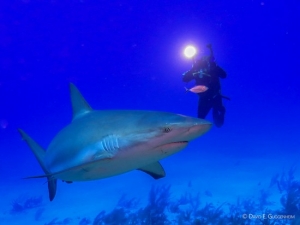
A photographer relishes the opportunity to photograph a Caribbean reef shark off of southern Cuba. Studies have shown that in some parts of the world a single shark can be worth one million dollars over its lifetime for tourism, versus a few hundred dollars if carved up and served on dinner plates.
Yet, tourism, if done right, can be a potent tool to lift up coastal communities and protect coral reefs. Our report recommends small-scale tourism, including using networks of casas particulares (private homes) and engaging locals to develop and deliver tourism opportunities for visitors. This is in sharp contrast to blanketing the coastline with Cancún-style hotels and importing workers from overseas.
The mass tourism model is outdated and has largely failed. More and more governments are recognizing that when it comes to tourism, it’s quality, not quantity that matters most. Those who have traveled to Cuba with us understand that many travelers are willing to pay a premium for an “authentic” experience, and Cuba remains exceptionally authentic.
Staying in small communities offers unique opportunities to experience the warmth of the Cuban people, share experiences and forge friendships, in stark contrast to experiencing the island through the glass window of a tour bus.
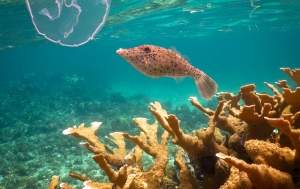
One of my favorite shots from the Punta Frances marine reserve on Cuba’s Isle of Youth. A trunk fish nibbles on a moon jelly in front of a healthy stand of healthy elkhorn coral. Tragically, elkhorn coral — one of the most important species for coral reef ecosystems — is now on the U.S. endangered species list and is 95 percent extinct in U.S. waters and similarly decimated throughout the Caribbean.
Ocean Doctor has been working for years with our Cuban colleagues toward solutions to these complex issues, but after what I have seen in Punta Frances, we now must accelerate our work and take it to a new level. We are working to bring together many of the parties involved in ensuring true protection for Punta Frances, including governmental agencies and academic institutions focused on environmental protection and tourism; agencies overseeing fishing; marine scientists and residents of coastal communities. Solutions for Punta Frances can represent solutions for other protected areas in Cuba.
Our work, as always, is ambitious, and as a U.S. organization working in Cuba, has always been about as difficult as it gets. But with the unraveling of relations between the U.S. and Cuba since 2016, our work has become more difficult now than in all of my years working there, including during the many years when we had no official diplomatic relations. It’s become so challenging that many nonprofit organizations are turning their attention to other countries, some leaving Cuba. Foundations are cutting their budgets or leaving Cuba altogether.
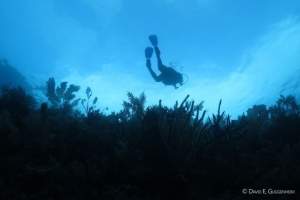
While others organizations have left Cuba since 2016, Ocean Doctor has remained despite extraordinary political challenges
While others have departed, Ocean Doctor has stayed, continuing our efforts to work in collaboration with our talented Cuban colleagues to make a difference. But with diminishing financial support from traditional sources, today we are more reliant than ever on support from people like you, who understand the importance of coral reefs to our planet and the fact that we now face the very real possibility of losing many of the healthiest coral reefs left in the Caribbean.
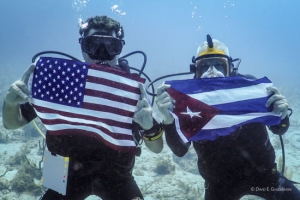
Saving coral reefs and our oceans requires working across borders despite formidable challenges in the ever-changing political winds.
Your support of our work will help us make a difference at a time when the stakes are highest and the headwinds are strongest. Please support our unwavering efforts to make sure that healthy and vibrant coral reefs thrive for generations to come. Meanwhile, please accept my warmest wishes for a holiday season full of joy….and hope.

David E. Guggenheim, Ph.D.
Founder & President

